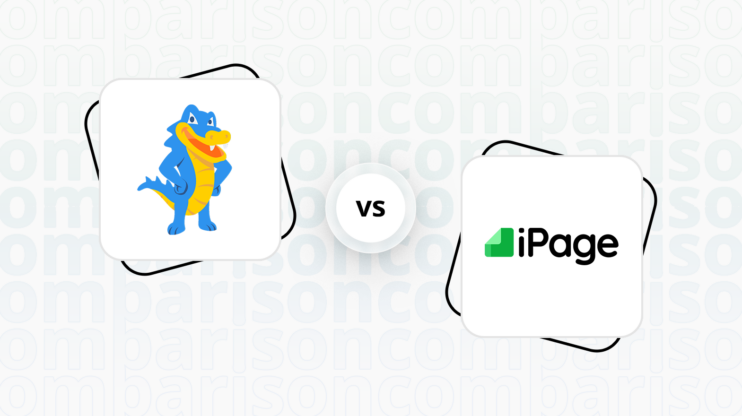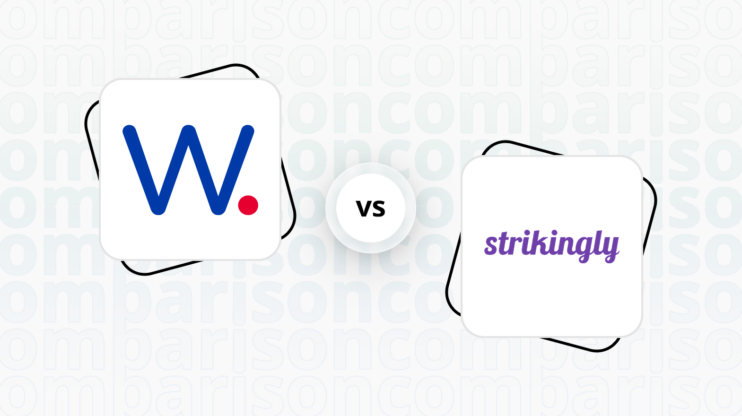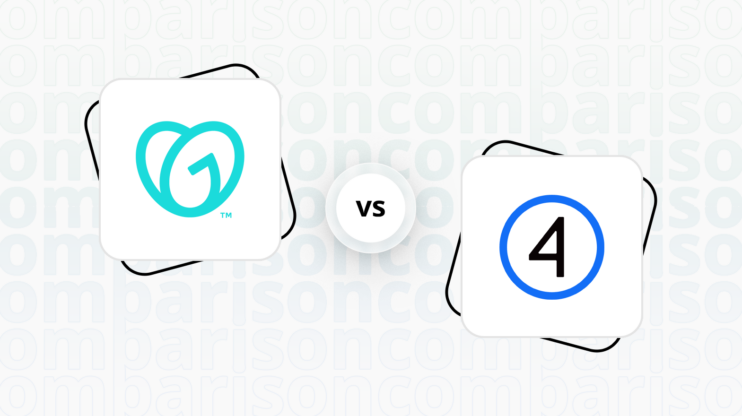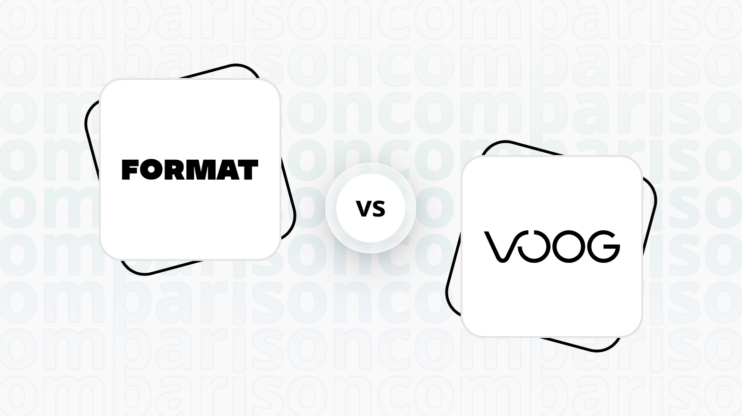Final verdict
Elementor and Unbounce both offer unique strengths, catering to different user needs and preferences.
-
Elementor (Overall Grade: 7.4/10)
is a versatile website builder plugin for WordPress, known for its flexibility and extensive design functionalities. It excels in providing a wide range of templates, a user-friendly drag-and-drop interface, and robust ecommerce features through WooCommerce integration. Elementor is ideal for users seeking a comprehensive website building solution with advanced customization options and strong support for responsive design. -
Unbounce (Overall Grade: 6.4/10)
specializes in creating high-converting landing pages, popups, and sticky bars. It offers a powerful drag-and-drop editor, a variety of templates focused on conversion optimization, and seamless integration with marketing tools. Unbounce is perfect for marketers and businesses looking to optimize their conversion rates and launch effective campaigns without needing coding skills.

|

|
|
|---|---|---|
|
Design functionalities & templates |
9.2 |
7.8 |
|
Ease of use |
8.8 |
8.2 |
|
Ecommerce |
7.6 |
4.8 |
|
Website editors |
8.5 |
7.5 |
|
Product testing options |
5.6 |
6.6 |
|
Price |
8.0 |
7.0 |
|
Hosting quality |
7.8 |
3.9 |
|
Website speed optimization |
6.7 |
5.6 |
|
Plugins/extensions and integrations |
7.6 |
6.8 |
|
Marketing features |
7.8 |
7.4 |
|
Customer support |
7.2 |
7.7 |
|
Website security |
9.1 |
8.4 |
|
AI capabilities |
7.4 |
7.5 |
|
User management |
8.8 |
7.2 |
Best for ecommerce
 7.6
7.6
 4.8
4.8
Verdict
: Elementor is better suited for comprehensive ecommerce solutions, while Unbounce excels in creating high-converting landing pages.
-
Elementor
: With a score of 7.6, Elementor integrates seamlessly with WooCommerce, providing a robust platform for building and managing online stores. It offers customizable product pages, ecommerce widgets, and shopping cart customization, making it ideal for businesses looking to create a full-fledged online store. When comparing Elementor vs Unbounce, Elementor stands out for its extensive ecommerce features and flexibility. -
Unbounce
: Scoring 4.8, Unbounce focuses on creating targeted landing pages that can integrate with ecommerce solutions like Shopify and Ecwid. While it lacks the comprehensive ecommerce features of Elementor, it excels in conversion optimization, making it a strong choice for businesses looking to create high-converting landing pages rather than full online stores.
Best for informational & business websites
 8.9
8.9
 5.9
5.9
Verdict
: Elementor is the superior choice for creating informational and business websites, offering greater flexibility, design options, and robust security measures compared to Unbounce.
-
Elementor
: Elementor excels in building informational and business websites with its visual drag-and-drop interface, extensive range of widgets, and over 100 responsive website kits. It supports responsive design, ensuring websites look great on all devices, and integrates seamlessly with various WordPress themes and plugins. With a score of 8.9, Elementor is ideal for both beginners and professional web designers looking for a versatile and powerful website builder. -
Unbounce
: Unbounce, scoring 5.9, is tailored more towards creating high-converting landing pages, popups, and sticky bars. While it offers a user-friendly drag-and-drop interface and a variety of templates, its primary focus on conversion optimization makes it less suitable for general informational websites. Unbounce integrates well with numerous marketing tools and analytics platforms, making it a strong contender for marketers but not the best choice for broader website needs.
Detailed comparison
Design functionalities & templates
Design FunctionalitiesRepresents how well each platform allows for creative design and customization of websites.Score Components:
- Template Variety (30%): Range and quality of design templates.
- Customization (30%): Flexibility and options for design alterations.
- User Interface (20%): Ease and intuitiveness of the design process.
- Responsiveness (10%): Adaptability to different devices and screen sizes.
- Innovation (10%): Unique design features and tools.
 9.2
9.2
 7.8
7.8
🏆
Winner: Elementor.
If you’re looking for a platform that offers more creative control and a wide array of design features, Elementor is the preferred choice.
Elementor offers an extensive range of templates and designs, with over 100 responsive website kits covering various categories like business, creative, education, and more, directly available through Elementor’s platform. Additional sources like Envato Elements, Template Monster, and others provide a wider selection, including free and premium options, catering to diverse web design needs.
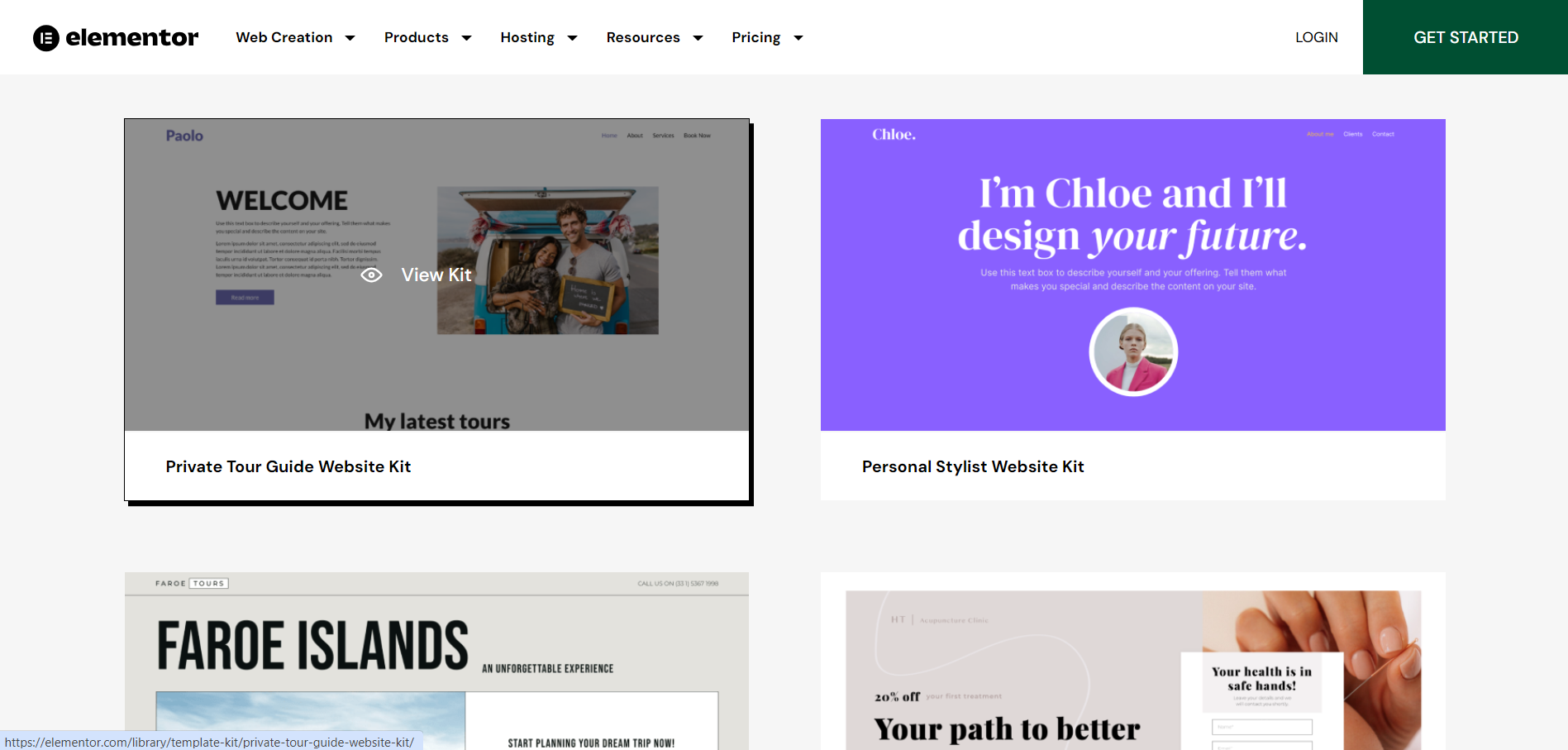
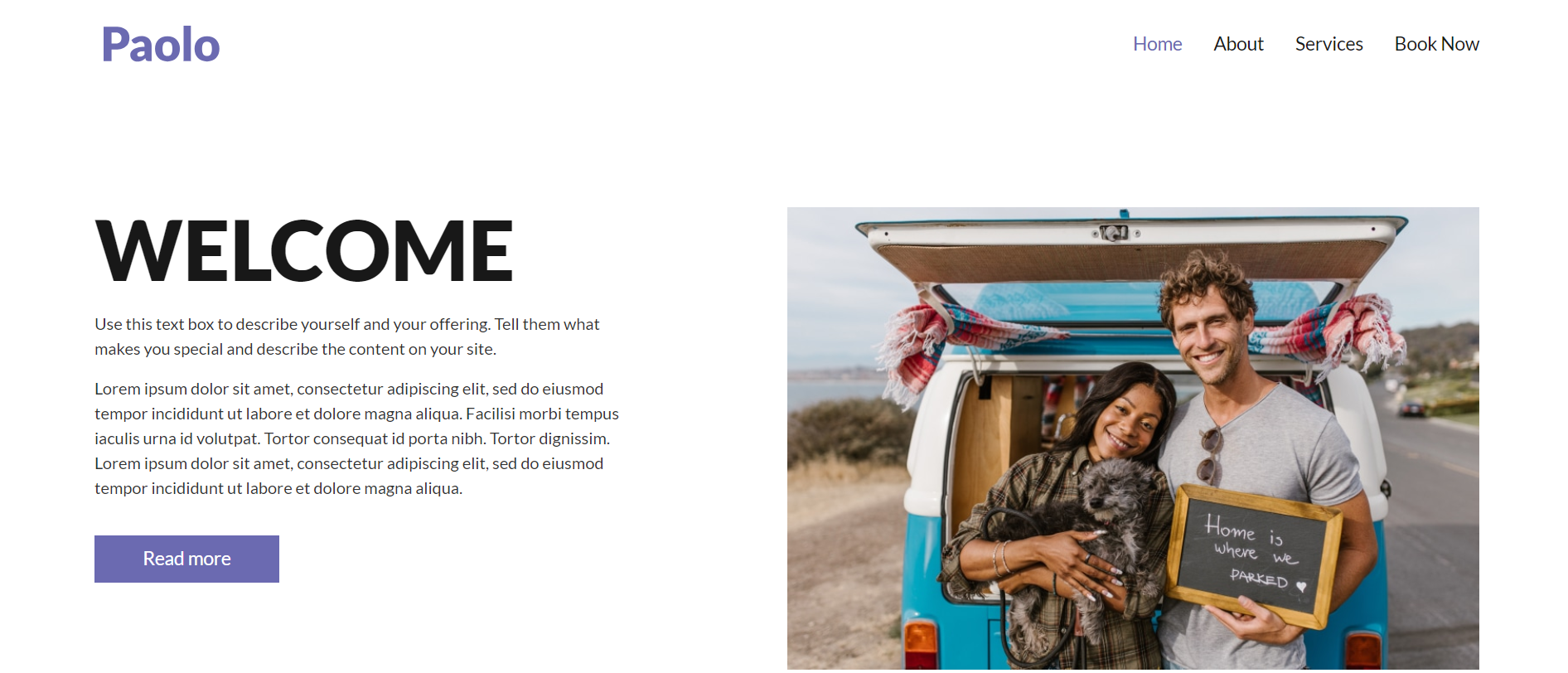
Compared to Elementor, Unbounce provides a gallery of over 100 high-converting templates for landing pages, popups, and sticky bars. These templates are designed with conversion in mind, incorporating knowledge and insights gained from Unbounce’s experience in optimizing landing pages. Users have the flexibility to choose from these ready-to-use templates or start with a blank canvas to create their own designs using Unbounce’s drag-and-drop builder.
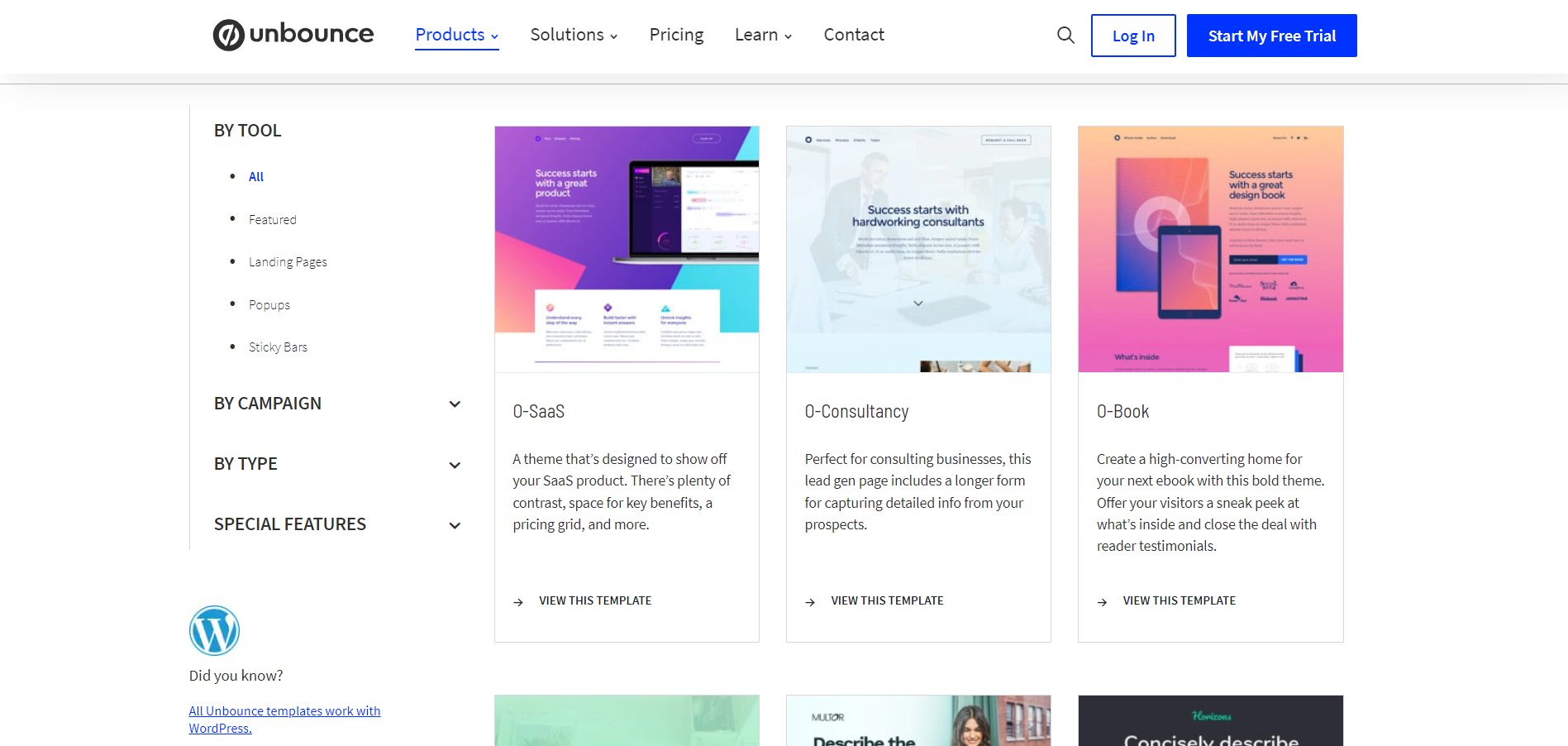
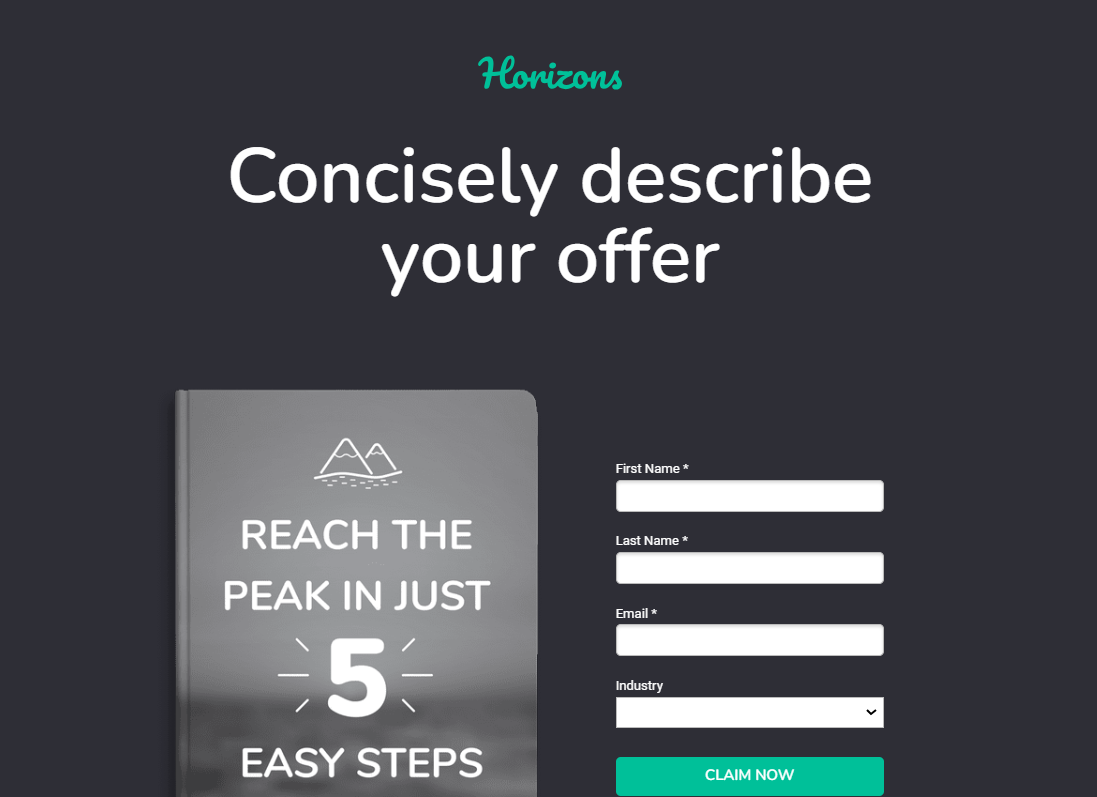
Get a head start on website creation with AI
Create a custom website tailored to your business needs 10X faster with 10Web AI Website Builder!
Ease of use
Ease of useReflects the platform’s overall user-friendliness.Score
Components:
- Learning curve (40%): Quickness and ease of getting started.
- Interface design (30%): Simplicity and intuitiveness of layout.
- User guidance (20%): Quality of tutorials and support.
- Flexibility (10%): Adaptability to various user skills.
 8.8
8.8
 8.2
8.2
🏆 Winner: Elementor
. With a score of 8.8, Elementor edges out Unbounce, which scored 8.2. Elementor’s user-friendly interface, drag-and-drop functionality, and wide range of pre-designed templates make it a more intuitive platform for building websites. However, Unbounce’s focus on creating high-converting landing pages and its suite of advanced features make it a strong contender.
Learning Resources
🏆 Winner: Elementor
. Both platforms offer a wealth of learning resources, but Elementor’s extensive array of tutorials and guides, both official and from the wider community, make it a more comprehensive learning resource for users.
For ecommerce
EcommerceMeasures the platform’s effectiveness in supporting online business activities.Score Components:
- Ecommerce themes and templates (20%): Variety and design of templates.
- Product management (25%): Ease of managing and organizing products.
- Payment options (25%): Variety and convenience of payment methods.
- Ecommerce features (20%): Features for managing an ecommerce store.
- Integration (10%): Compatibility with external e-commerce tools and services.
 7.6
7.6
 4.8
4.8
Elementor and Unbounce offer different approaches to ecommerce. Elementor, with its integration with WooCommerce, provides a more traditional online store setup with customizable product pages, ecommerce widgets, and shopping cart customization. Unbounce, on the other hand, focuses on creating highly targeted ecommerce landing pages, aiming to double conversion rates compared to traditional online stores.

|

|
|
|---|---|---|
|
Ecommerce themes and templates |
7.8 |
2.0 |
|
Product page customization |
8.4 |
3.0 |
|
Payment processing and commissions |
7.5 |
6.5 |
|
POS capabilities |
5.5 |
0.0 |
|
Payment gateways |
7.0 |
7.0 |
|
Product numbers |
7.0 |
0.0 |
|
Additional ecommerce features |
8.0 |
4.5 |
Elementor ecommerce features:
- WooCommerce Integration
- Customizable Product Pages
- Ecommerce Widgets
- Product Categories and Filters
- Shopping Cart Customization
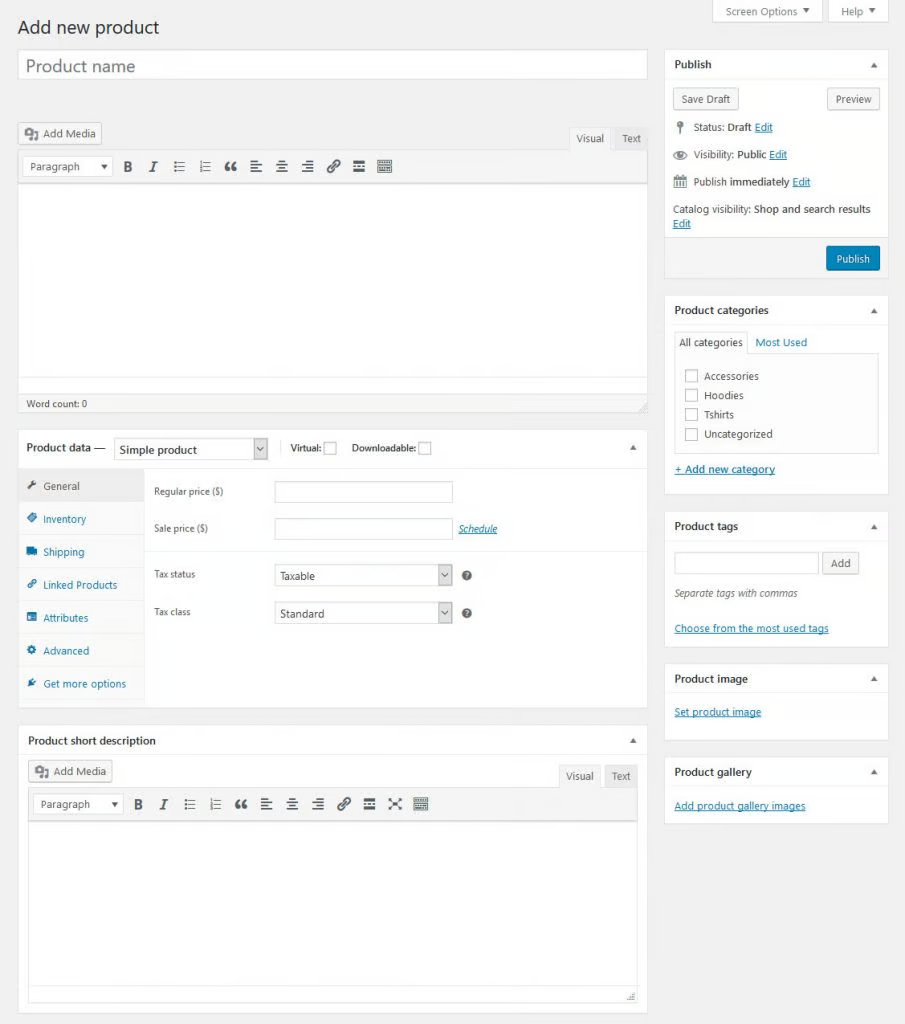
Unbounce ecommerce features:
- Shopify, Ecwid, or and other ecommerce solutions integration
Ecommerce themes & templates
Elementor offers a diverse range of ecommerce-specific templates suitable for various online stores, from free options for budget-conscious users to premium templates with advanced customization features. These templates are designed to be mobile-responsive and SEO-friendly, ensuring optimal performance across devices and search engines. Unbounce, however, primarily focuses on building landing pages and does not have ecommerce specific templates.
Product page customization
Elementor offers extensive customization options for WooCommerce product pages, including custom layouts, WooCommerce widgets for various product elements, and options for styling product galleries and ‘Add to Cart’ buttons. Unbounce, on the other hand, does not have the possibility to create or customize product pages, it’s primarily focused on building landing pages, with the possibility to integrate with ecommerce platforms such as Shopify or Ecwid.
Payment processing
When it comes to payment processing, Elementor supports several payment gateways, notably through plugins and integrations, with Stripe and PayPal being prominent options for simple and widespread use. Unbounce supports payment processing through an integration with Stripe, allowing users to create landing pages that can handle transactions directly.
Website Editors
Website EditorsEvaluates the platforms’ website building and editing capabilities.Score Components:
- Customization tools (40%): Range and power of editing features.
- Editor usability (30%): User experience within the editor.
- Design flexibility (20%): Freedom in layout and design changes.
- Update and maintenance ease (10%): Simplicity of updating and maintaining the site.
 8.5
8.5
 7.5
7.5
🏆
Winner: Elementor
. Elementor, with a score of 8.5, offers a drag-and-drop interface that makes it easy to customize layouts, add content, and style websites visually in real-time. With a wide array of widgets and templates, users can effortlessly design complex elements such as sliders, forms, and animated headlines. Additionally, Elementor provides responsive design options, ensuring websites look great on all devices, alongside advanced features like custom CSS, role-based access control, and integration with a variety of marketing tools.
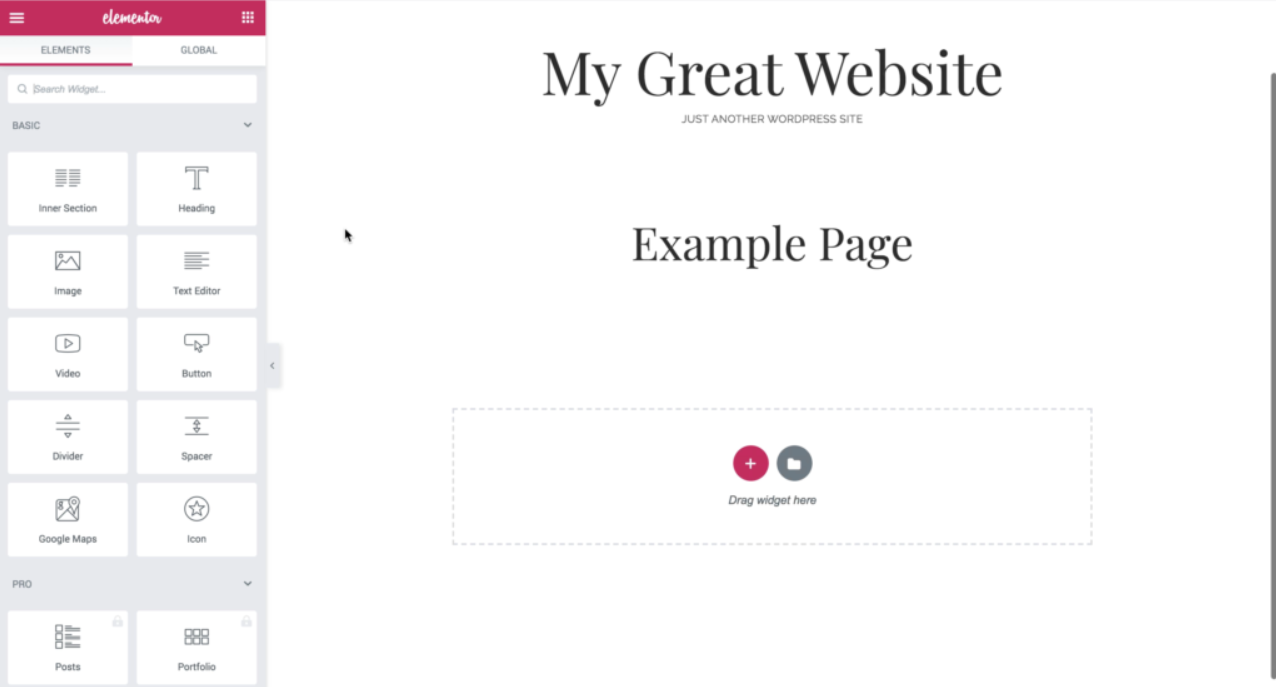
Unbounce’s editor, scoring 7.5, is equipped with a user-friendly drag-and-drop interface, enabling users to design and customize landing pages without the need for coding skills. It offers a variety of templates, widgets, and elements such as forms and buttons, alongside options for integrating custom HTML, CSS, and JavaScript for advanced customization. The platform supports responsive design, ensuring landing pages perform well across all devices, and includes features for A/B testing and dynamic text replacement to optimize conversion rates. Additionally, it allows for the integration of various marketing tools and platforms, enhancing the effectiveness of digital marketing campaigns.
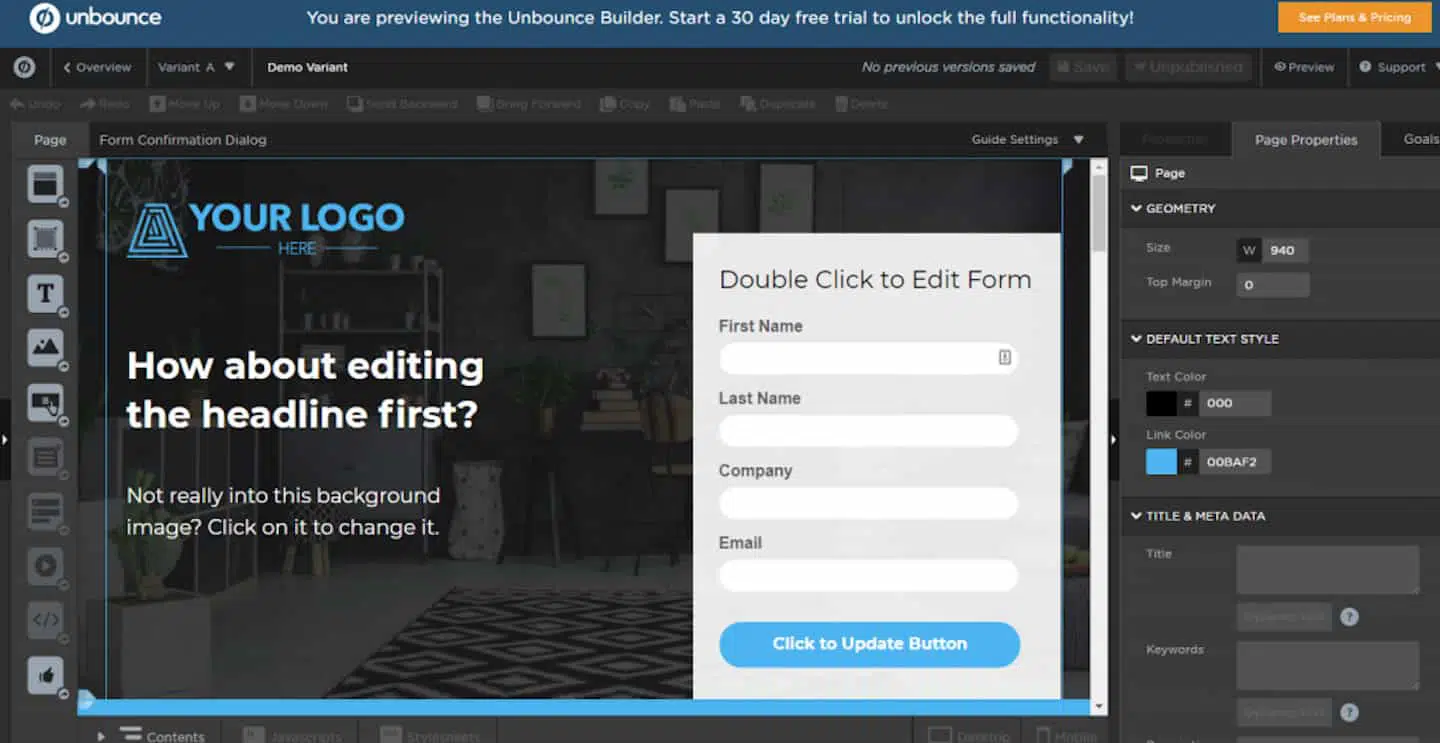
Mobile editor/app
 0
0
 0
0
🏆
No Winner
. Neither Elementor nor Unbounce offer a dedicated mobile editor or app for editing websites. This means that users will need to use a desktop or laptop computer to make changes to their websites. While this may not be a significant issue for some users, it could be a drawback for those who prefer to manage their websites on the go.
Therefore, neither platform can be declared a winner in this category.
Product testing options
Product Testing OptionsAssesses the options for trying out platform features before commitment.Score Components:
- Trial quality (40%): Extent and usefulness of the trial or free version.
- Feature accessibility (30%): How many features are available to test.
- Trial duration (20%): Length of the trial period.
- Ease of transition (10%): Smoothness of moving from trial to paid plans.
 5.6
5.6
 6.6
6.6
Overall Result
:
Unbounce Wins
. Unbounce scores 6.6, slightly higher than Elementor’s 5.6. Unbounce offers a 14-day free trial where users can test all premium features, but requires billing information. Elementor, on the other hand, offers a free version for self-hosted WordPress.org users and allows testing of all premium features during the refundable period. However, it does not offer a trial version.

|

|
|
|---|---|---|
|
Free Plan |
Yes, but only for self-hosted WordPress.org |
No |
|
Trial Duration |
No |
14 days |
|
Testing Premium Features |
Possible during refundable period |
Possible during 14-day free trial, requires billing information |
|
Money Back Guarantee |
30-day money back guarantee |
No |
Price
PriceLooks at the cost-effectiveness and value for money of each platform.Score Components:
- Plan value (40%): What each pricing tier offers.
- Transparency and clarity (30%): Clearness of pricing structures.
- Flexibility of plans (20%): Range of options to suit different budgets.
- Hidden costs (10%): Additional expenses not included in the plan.
 8.0
8.0
 7.0
7.0
Elementor and Unbounce offer different pricing plans to cater to various user needs.

|

|
|
|---|---|---|
|
$0-$10 |
Basic ($9.99/month): 1 website, with 10GB SSD storage, 25k monthly visitors, 30GB monthly bandwidth, daily auto backups stored for 14 days, Cloudflare CDN, and integrated caching tool. Value for price: 6.5 |
No offering at this amount. |
|
$10-$20 |
Business ($19.99/month): 1 website, with 20GB SSD storage, 50k monthly visitors, 50GB monthly bandwidth, daily auto backups stored for 30 days, Cloudflare CDN, integrated caching tool and access to staging environment. Value for price: 7.5 |
No offering at this amount. |
|
$20-$30 |
Grow ($22.99/month): 3 websites, with 30GB SSD storage, 75k monthly visitors, 75GB monthly bandwidth, daily auto backups stored for 30 days, Cloudflare CDN, integrated caching tool, access to staging environment and site cloning. Value for price: 8.5 |
No offering at this amount. |
|
$45-$100 |
Scale ($49.99/month): 10 websites, with 40GB SSD storage, 100k monthly visitors, 100GB monthly bandwidth, daily auto backups stored for 30 days, Cloudflare CDN, integrated caching tool, access to staging environment and site cloning. Value for price: 9.0 |
Build ($99.00/month): Provides tools for building and launching high-converting landing pages, unlimited pages, popups, sticky bars, a form builder, free hosting, AI copywriting, custom scripts, 1,000+ integrations, support for 1 root domain with unlimited subdomains, catering up to 20,000 monthly unique visitors. Value for price: 6.5 |
|
$100-$200 |
No offering at this amount. |
Experiment ($149.00/month): Includes everything in the Build plan plus unlimited A/B tests, advanced reporting, dynamic text replacement, support for 2 root domains, and up to 30,000 monthly unique visitors. Value for price: 7.5 |
|
$200-$300 |
No offering at this amount. |
Optimize ($249.00/month): Adds to the Experiment plan with AI traffic optimization, visitor behavior insights, advanced targeting, supports 3 root domains, and caters to up to 50,000 monthly unique visitors. Value for price: 8.0 |
|
$600+ |
No offering at this amount. |
Concierge (Starting at $649/month): Offers everything in the Optimize plan plus dedicated support, implementation services, client and user management, flexible add-on plans for scaling, starting with 5 root domains and 100,000 monthly unique visitors, with options to scale. Value for price: 8.5 |
location. As a result in rare cases the prices displayed here can differ from the ones you see on their
websites.
Hosting quality
Hosting
qualityExamines the reliability and performance of the hosting solutions.Score Components:
- Uptime (40%): Consistency and reliability of website availability.
- Speed (30%): Loading times and performance.
- Bandwidth and storage (20%): Sufficiency of resources provided.
- Data centers (10%): Quality and distribution of hosting infrastructure.
 7.8
7.8
 3.9
3.9
🏆
Winner: Elementor
Elementor offers managed WordPress hosting with a 99.9% uptime guarantee and a data center in Belgium. Unbounce also offers hosting but does not specify the type and does not disclose the locations of its data centers. Despite having a slightly higher uptime, Unbounce does not offer an uptime guarantee. Therefore, Elementor is the winner in this comparison due to its transparency and the quality of its hosting service.

|

|
|
|---|---|---|
|
Do they offer hosting? |
Yes, included in all their plans |
Yes, but the platform does not specify the type of hosting it provides |
|
Data Centers: |
1 data center in Belgium |
Unbounce does not disclose the locations of its data centers |
|
Type of hosting: |
Managed WordPress Hosting |
The platform does not specify the type of hosting it provides |
|
Uptime: |
99.9% |
99.96% |
|
Uptime Guarantee: |
Yes, 99.9% |
No |
Website Speed Optimization
Website Speed OptimizationEvaluates optimization of website loading timesScore Components:
- PageSpeed Score (30%): Google’s score indicating performance optimization.
- Loading Time (30%): The average time until a website is fully interactive.
- Mobile Optimization (15%): Optimization effectiveness for mobile devices.
- Resource Optimization (15%): Optimizing images, scripts, and other heavy resources.
- CDN Usage (10%): Use of CDN to enhance speed across geolocations.
 6.7
6.7
 5.6
5.6
🏆 Winner: Elementor
Both Elementor and Unbounce have strategies in place for website speed optimization, but Elementor has a slightly higher score in this area.

|

|
|
|---|---|---|
|
Focus |
Lazy Loading, Code Minification, Caching, CDN |
Image optimization, Caching, Speed Booster |
|
Performance Tools |
Not specified |
Not specified |
|
Key Strategies |
Lazy Loading, Code Minification, Caching, CDN |
Image optimization, Caching, Speed Booster |
|
Load Times |
Varies depending on optimization and website complexity |
Varies depending on optimization and website complexity |
|
Page Speed Scores Range |
Not specified |
Not specified |
|
Core Web Vitals Improvement |
Not disclosed |
Not disclosed |
Elementor, a popular website builder plugin for WordPress, focuses on website speed optimization strategies such as lazy loading, code minification, caching, and CDN. However, the load times and PageSpeed scores can vary depending on the optimization and complexity of the website. Elementor does not disclose any information about its Core Web Vitals improvements.
Unbounce, a website builder specifically designed for creating custom landing pages, popups, and sticky bars, also has strategies in place for website speed optimization. These include image optimization, caching, and a Speed Booster. Similar to Elementor, the load times and PageSpeed scores can vary depending on the optimization and complexity of the website. Unbounce does not provide any information on their Core Web Vitals improvements.
Get a head start on website creation with AI
Create a custom website tailored to your business needs 10X faster with 10Web AI Website Builder!
Plugins and integrations
Plugins and integrationsMeasures the range and effectiveness of additional plugins and integrations.Score Components:
- Variety of options (40%): Range of available add-ons.
- Integration smoothness (30%): Ease of integrating plugins into the site.
- Quality of plugins (20%): Functionality and reliability of the options.
- Custom integration capabilities (10%): Support for custom or third-party integrations.
 7.6
7.6
 6.8
6.8
🏆 Winner: Elementor.
Elementor scores 7.6, offering a wide range of both free and premium add-ons to enhance website building. It provides advanced features such as theme building, dynamic content, and extensive widget libraries. Unbounce, with a score of 6.8, also offers a variety of apps and integrations, but they are mainly focused on enhancing the functionality of landing pages. Elementor’s flexibility and versatility in extending functionalities give it the upper hand.
It is worth mentioning that all of Unbounce’s apps and integrations are free to install, providing a cost-effective solution for users.
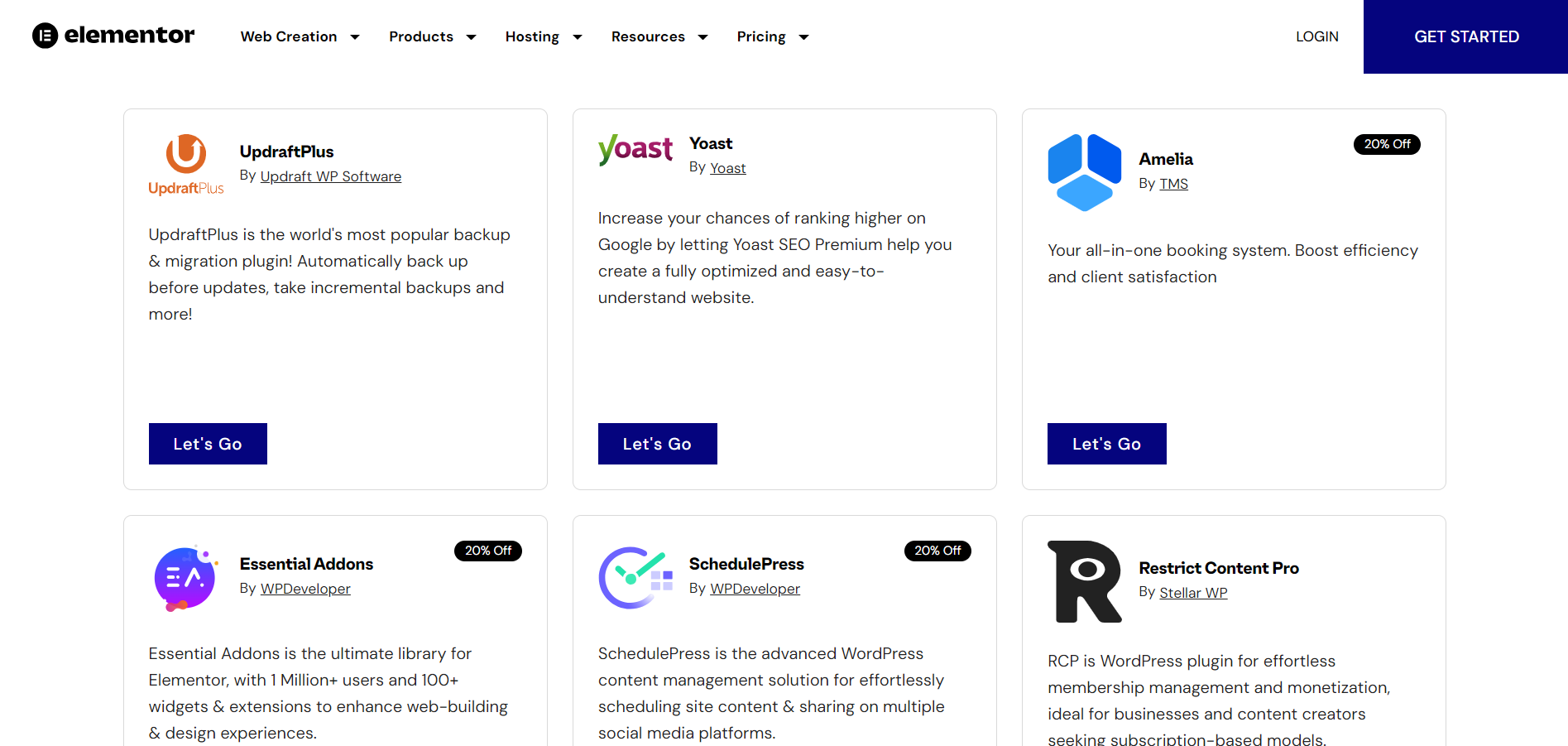

Marketing Features
Design FunctionalitiesRepresents how well each platform allows for creative design and customization of websites.Score Components:
- Template Variety (30%): Range and quality of design templates.
- Customization (30%): Flexibility and options for design alterations.
- User Interface (20%): Ease and intuitiveness of the design process.
- Responsiveness (10%): Adaptability to different devices and screen sizes.
- Innovation (10%): Unique design features and tools.
 7.8
7.8
 7.4
7.4
🏆
Overall Winner: Elementor
. Elementor edges out Unbounce with a slightly higher score, offering a more comprehensive set of marketing features, including blogging capabilities and a wider range of social media integrations. Unbounce, however, excels in conversion optimization and offers robust analytics and reporting tools.

|

|
|
|---|---|---|
|
SEO Tools |
Yes, with integration of various SEO plugins |
Yes |
|
Email Marketing |
Yes, with integration of various email marketing services |
Yes, with integration of third-party services |
|
Blogging |
Yes |
No |
|
Social Media Integration |
Yes, integration of social media buttons |
Yes |
|
Analytics and Reporting |
Yes, with integration of Google Analytics |
Yes |
|
Ads and Promotions |
Yes |
Yes, Unbounce landing pages can be used for ad campaigns |
Customer Support
Customer supportEvaluates the quality and availability of support options.Score Components:
- Response time (40%): Speed of support responses.
- Support quality (30%): Effectiveness and helpfulness of the support.
- Availability (20%): Range of support channels (phone, chat, email).
- Resource richness (10%): Quality of self-help and educational materials.
 7.2
7.2
 7.7
7.7
🏆 Winner: Unbounce
. In the comparison of Elementor vs Unbounce, Unbounce takes the lead with its comprehensive support options. Unbounce offers live chat, email, and phone support, with live chat and phone support available Monday to Friday, from 6 AM to 6 PM PST. Additionally, users can access 24/7 support through their Help Centre, Community, and Chat Bot, ensuring continuous assistance.
Elementor, on the other hand, provides 24/7 support through ticketing and live chat, ensuring users can get help at any time. However, it lacks the enterprise-level support that Unbounce offers, which includes dedicated customer support and personalized training sessions aimed at optimizing campaign performance. This makes Unbounce a more robust option for users seeking extensive support and resources.
Security
SecurityLooks at the platforms’ security measures and data protection.Score Components:
- Data protection (40%): Safeguards for user and customer data.
- SSL and encryption (30%): Implementation of secure connections.
- Compliance (20%): Adherence to industry security standards.
- Regular updates (10%): Frequency of security updates and patches.
 9.1
9.1
 8.4
8.4
🏆
Winner: Elementor
. Elementor’s security measures are robust and comprehensive, leveraging Google Cloud’s infrastructure for high security, including end-to-end encryption. They also offer a variety of hosting solutions to cater to different needs, and they are committed to transparency in their use of cookies and tracking technologies. Elementor also ensures website security and performance through advanced hosting features, including the use of Google Cloud Platform’s C2 servers and integration with Cloudflare’s Enterprise CDN. They employ both active and passive security measures, including 24/7 monitoring, regular updates, backups, and specialized security protocols to protect against common threats.
Unbounce also prioritizes security, achieving PCI Level 4 Merchant status and adhering to GDPR. They implement robust disaster recovery strategies and undergo regular external security audits. Their platform employs a secure, multi-tenant environment with strict access controls and daily data backups to safeguard customer information. Unbounce’s systems reside within a private virtual network on AWS, prioritizing the minimization of attack risks and swift recovery processes. However, Elementor’s higher security score and more comprehensive security measures give it the edge in this comparison.
AI Capabilities
AI capabilitiesMeasures the effectiveness of AI-driven features and tools.Score Components:
- Automation efficiency (40%): Impact of AI on streamlining processes.
- Personalization (30%): AI-driven customization for users or customers.
- AI-Assisted design (20%): Role of AI in website design and functionality.
- Data analysis (10%): Use of AI in interpreting user data and analytics.
 7.4
7.4
 7.5
7.5

|

|
|
|---|---|---|
|
AI Builder |
Elementor AI builder for efficient website creation |
Unbounce’s Smart Builder for optimized landing page creation |
|
AI Ecommerce features |
AI-driven features for eCommerce websites |
|
|
AI Content Generation |
Text, code, and image generation |
Smart Copy for generating various types of content |
|
Additional AI features |
Integration of third-party AI powered WordPress plugins |
Smart Traffic and Conversion Intelligence Insights |
🏆 Winner: Elementor
. Elementor, with a score of 7.4, offers a more comprehensive set of AI capabilities, particularly for eCommerce websites. Its AI builder and content generation capabilities enhance the efficiency and creativity of the website creation process.
Unbounce, scoring 7.5, focuses its AI capabilities on optimizing landing page creation and improving conversion rates. While it does not offer AI ecommerce features, its Smart Copy tool and additional AI features like Smart Traffic and Conversion Intelligence Insights are valuable for enhancing the effectiveness of landing pages.
User Management
User ManagementAssesses the platforms’ capabilities in managing user roles, permissions, and accessibility.Score Components:
- Role Customization (40%): Flexibility in creating and defining user roles and
permissions. - Ease of Management (30%): User interface and tools for managing users.
- Access Control (20%): Effectiveness of access control measures for different user
levels. - Scalability (10%): Ability to manage a growing number of users efficiently.
 8.8
8.8
 7.2
7.2
🏆 Winner: Elementor
. Elementor and Unbounce offer different approaches to user management.
- Elementor operates on WordPress, and the number of users who can edit or manage a website depends on the roles and permissions set within WordPress. Administrators have full access to edit any part of the site, including Elementor settings, while Editors can manage posts and pages made with Elementor. Authors and Contributors have limited capabilities. Elementor Pro offers a Role Manager feature, enabling further customization of what different roles can do within Elementor.
- Unbounce offers one staff account on its basic plan, with the option to expand up to 15 accounts on the premium plan. It also provides customizable permissions, enabling you to restrict or grant access based on roles such as viewer, author, and administrator.
Elementor User Roles and Access Levels:
| Role | Description | Access Highlights |
|---|---|---|
| Administrator | Users with full access to all administration features, including Elementor settings. | Can edit all content, Access to Elementor settings, Can install plugins and themes, Can manage users |
| Editor | Users who can manage and publish content including pages and posts. | Can edit pages/posts created with Elementor, Cannot access Elementor settings, Can manage categories, tags, and links, Can moderate comments |
| Author | Users who can publish and manage their own posts. | Can create posts with Elementor, Cannot edit pages, Limited access to media library, Cannot access Elementor settings |
| Contributor | Users who can write and manage their own posts but cannot publish them. | Can create content with Elementor, Cannot publish or edit pages, No access to Elementor settings, Submissions require review by higher-level roles |
Unbounce User Roles and Access Levels:
| Role | Description | Access Highlights |
|---|---|---|
| Viewers | Members of your team who want to view and approve pages, popups, or sticky bars before publication. | Can access pages, popups, sticky bars, stats, and leads. Cannot edit/manage pages or access account management, billing details, domains, or add users. |
| Authors | Designers or copywriters invited to edit landing pages. | Can edit, manage, publish/unpublish pages, popups, sticky bars. Have access to viewing leads and stats. Cannot access account management, billing details, domains, or add users. |
| Administrators | Manage the Unbounce account, including billing details. | Can edit, manage, publish/unpublish pages, popups, sticky bars. Can access account management, billing details, domains, and add users. Cannot delete leads or remove other Admins. |
Additional Features

|

|
|
|---|---|---|
|
SSL Certificate |
|
|
|
Custom Domain |
|
|
|
Free Custom Domain Included |
|
|
|
International Domains |
|
|
|
Mobile Responsive |
|
|
|
Page Speed |
|
|
|
Website Builder Mobile App |
|
|
|
Convert a Website To An App |
|
|
|
Website Analytics |
|
|
|
Multilingual Sites |
|
|
|
Multiple Users |
|
|
User Feedback
Elementor is widely appreciated for its intuitive drag-and-drop interface, enabling rapid creation of professional and responsive websites without coding skills. It offers a vast range of templates and compatibility with WordPress, making it a go-to for diverse users. Despite its benefits, concerns arise regarding website loading times, subscription costs, and occasional compatibility issues. Feedback on customer support and legacy plan management is mixed, with some users experiencing dissatisfaction. Overall, Elementor is valued for its efficiency in web development, although some aspects, particularly support services, could be improved.
The reviews for Unbounce reveal a mixed sentiment among users. On the positive side, many appreciate its user-friendly, drag-and-drop page builder, which facilitates the quick creation and editing of landing pages without the need for technical expertise. Users find it beneficial for A/B testing, integrating with CRMs, and swiftly turning around marketing content. However, there are notable concerns, particularly with a case of unexpected switch to an annual plan without consent and refusal to refund, indicating potential issues with customer service and billing practices. Additionally, some users mention technical limitations, such as responsiveness issues and the absence of global elements for content updates across multiple pages, which can hinder efficiency.
The making of this blog
We followed a clear, step-by-step process to write and research this article.
FAQ
Which is better for creating landing pages, Elementor or Unbounce?
Can I use Elementor and Unbounce for ecommerce websites?
How do Elementor and Unbounce compare in terms of ease of use?
Which platform offers better customer support, Elementor or Unbounce?
Are Elementor and Unbounce suitable for beginners?
Which platform is more affordable, Elementor or Unbounce?
Can I integrate Elementor and Unbounce with other marketing tools?
Which platform is better for SEO, Elementor or Unbounce?
Do Elementor and Unbounce offer mobile-responsive designs?
Which platform should I choose for my website?











